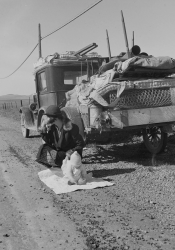Literary Event: The Grapes of Wrath
John Steinbeck was born and raised in Salinas, California where many of his stories take place. One of his most famous novels, The Grapes of Wrath, is a story about a single family (the Joads) as they leave their depreciated home & land for hope of work and wages in the west. The Joad family flees the Dust Bowl, which desecrated the abused soil of the southern central plains of America. Over 440,000 Oklahoma residents, or “Okies”, as they are derogatorily called in the book and in real life at the time, fled the state in hopes of avoiding going bankrupt and starvation in their most frail family members – particularly the children and elderly. (History) As if the Dust Bowl wasn’t enough for the destitute migrant workers, the agricultural catastrophe came into effect just as the Great Depression was in full swing; The first instance of storms occurred in 1930. Steinbeck was an educated man, though he did not finish his degree from Stanford University. After taking several jobs including farmhand, store clerk, and working closely with migrant workers, Steinbeck took it upon himself to document the lives of those who were less heard: the lower class. As if following in Henry Mayhew’s footsteps, John Steinbeck began doing some investigative journalism with the migrant workers of Salinas during the 1930s. He adapted their language, customs, livelihoods, and spiritual & economic palls in much of his writings, including Cannery Row, The Pearl, and Of Mice and Men. However, one of the most influential pieces about the lower class that Steinbeck wrote was undoubtedly The Grapes of Wrath in 1939.
In October of 1936, Steinbeck published 7 articles about his firsthand account of the working and living conditions of the migrant workers of Salinas, CA. (Steinbeck, The Harvest Gypsies) Many of his experiences with the migrant workers would influence The Grapes of Wrath, including the horrid conditions of the worker camps and the demoralization of the people that had moved their whole lives out of necessity, only to be faced with the greed and abuse of the larger farm owners. “The Migrants are needed, and they are hated.” (Steinbeck, 4) Steinbeck writes, “it has been the habit of the growers associations of the state to provide by importation, twice as much labor as was necessary, so that wages might remain low.” (Steinbeck, 7) Almost all of the points that Steinbeck makes in these articles is reaffirmed in the story of the Joads family in the Grapes of Wrath. In his efforts to bring compassion to these forgotten families, Steinbeck brought to light the truly horrifying lives of these poor, migrant workers and their families. When companies of families would arrive to work, they were typically controlled as much as the owners could do, including hiring deputies to police the worker camps, and de-stabilized any sort of congregation that the workers may have organized outside of their work. “if they are allowed to congregate, they will organize, and that is the one tiling the large ranches will not permit at any cost.” (16)
Steinbeck’s Grapes of Wrath wound up being the top-selling novel of 1939 & was a huge influence on the author being awarded the Nobel Prize for Literature in 1962. In 1940 it won the Pulitzer Prize, as well as premiered the critically acclaimed film adaptation by John Ford. (Britannica) Despite its massive success, much of the plight of the migrant worker was forgotten just as easily as the migrants themselves. Once WWII broke out, many of the families like the Joads were able to leave their traditional agricultural work, and flocked to industrial labor. It wasn’t until decades later, in 1975, when state legislature was established under the Agricultural Labor Relations Board, which allowed for collective bargaining for farmworkers in California. (Wollenberg, Intro)
Related Links:
Mary Seacole & The Crimean War - Mary Seacole's autobiographical account of the Crimean War was a well sought after story for its time. Like Steinbeck, Seacole wanted to tell the real story of the historical event, and not just gloss over it with romantic, nostalgia colored glasses.
The Exclusion and Detention of Japenese Americans During WWII - This is not a direct 1-1 connection, but The Grapes of Wrath does have a theme of discrimation against those labelled "Okies". Farmers had to pack up and leave everything they had to try and feed their families, but once they got to California, they were treated like animals & taken advantage of at every chance. The reality was, the choice was work for 3 cents a day, or watch your children & grandparents starve.
Work Cited:
Bauer, Patricia. “The Grapes of Wrath”. Britannica. May 18, 2020. Retrieved from: https://www.britannica.com/topic/The-Grapes-of-Wrath
Charles Wollenberg, "Introduction," in The Harvest Gypsies: On the Road to The Grapes of Wrath, (Berkeley: Heyday Books), 1988.
History.com Editors. “Dust Bowl”. History. Aug 5, 2020. Retrieved from: https://www.history.com/topics/great-depression/dust-bowl
Lange, Dorothea. "Migrating Okies". Encyclopedia Britannica. April 29, 2022. Retrieved from: https://www.britannica.com/place/Dust-Bowl/images-videos#/media/1/174462...
Steinbeck, John. “The Harvest Gypsies”. San Francisco News. Oct 5-12, 1936. Retrieved from: https://missthedogatemyhomework.files.wordpress.com/2013/12/john-steinbeck-the-harvest-gypsies.pdf

